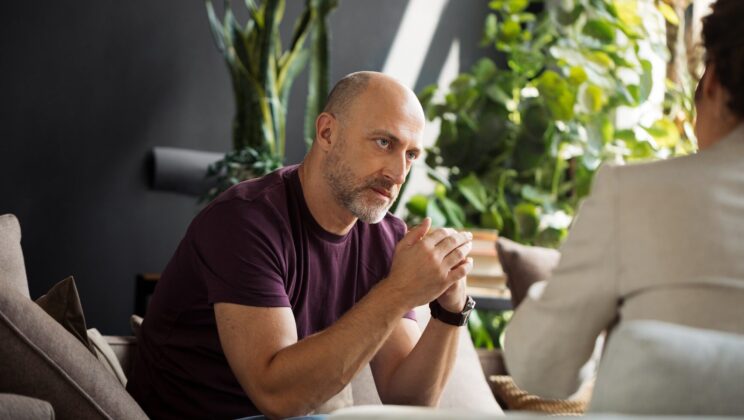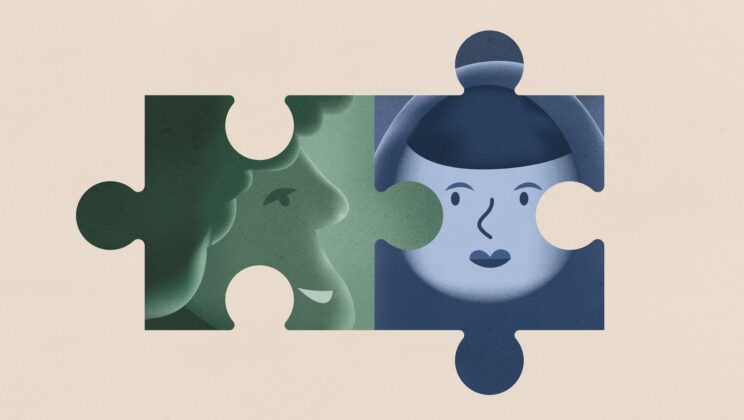Is Couples Therapy the Answer?
August 1, 2024
Healthy relationships are essential to happiness and fulfillment. We’re naturally drawn to others because relationships are important to our survival and bring joy and support into our lives. When our relationships face challenges, couples therapy can help you and your partner navigate difficulties to become stronger and more committed.
What is couples therapy?
Ever felt like you and your partner are speaking different languages or constantly hitting roadblocks in your relationship? Couples therapy helps people in relationships navigate conflict in a judgment-free zone where you can feel safe addressing difficult topics. During couples counseling, a specially trained relationship counselor teaches you better ways to communicate and support each other. Couples counseling can be useful for big relationship hurdles or everyday challenges and at any stage in a relationship.
Signs it may be time to consider couples therapy
While some couples who are doing pretty well in their relationship decide to give relationship counseling a try to get ahead of major issues, couples therapy should be considered if you're having difficulty:
- Calming intense emotions after a fight
- Reconnecting after an argument
- Soothing one another in times of stress
- Maintaining or re-building trust
- Communicating with your partner about your needs
- Resolving frequent arguments around the same issues
- Breaking through roadblocks to physical intimacy, emotional connection, or affection
- Navigating stressful events, such as the birth of a child, a career change, or the loss of a loved one
- Agreeing on long-term goals or values
- Talking openly about potential mental health issues
Agreeing on important parenting decisions
FAQs about couples therapy
#1 What’s the difference between couples therapy and individual therapy?
In therapy for couples, you work on relationship-focused goals with your partner. Individual therapy is one-on-one with a counselor whereas individual therapy and couples therapy can work hand in hand. In individual therapy, you can talk about topics you may not feel comfortable discussing in couples sessions, while also tackling issues that emerge during couples counseling.
#2 What happens during your first couples therapy session?
The first couples therapy session typically begins with an assessment where you and your partner set goals, talk about what you want to work on, and chat about what you can expect in future sessions. The assessment lays the groundwork for therapy—it helps your relationship counselor develop a plan that’s tailored to your needs. The relationship counselor may ask you about your history together, how you communicate, and what works in your relationship.
#3 Is couples therapy the same as marriage counseling?
Some people think couples therapy is the same thing as marriage counseling, but it’s not just for married people or traditional relationships. Relationship counseling is for all kinds of partners, whether you’re unmarried, LGBTQIA+, nonmonogamous, or polyamorous. As long as everyone is on the same page about relationship expectations, couples counseling can help you and your partner communicate and support each other better.
#4 Is online couples therapy effective?
Yes, therapy for couples via telehealth is just as effective as in-person relationship counseling. It can also be more convenient and give you access to therapists that don’t live locally. Online couples therapy may also feel more emotionally or physically safe for couples who are estranged or uncomfortable seeing each other in person.
#5 What’s the goal of couples therapy?
Each couple has their own unique goals in couples therapy, but many want to work on improving how they communicate. It’s common for one or both partners to feel like they’re not being listened to or understood. In therapy for couples, you'll learn to spot unhelpful behaviors and patterns and figure out healthier ways to talk about difficult topics to feel closer to each other.
#6 Does couples therapy work?
Some couples improve by 70% after relationship counseling. And numerous research-based treatments have shown to bring lasting change to relationships.
Therapy for couples tends to work best when both of you are committed to the process and willing to work on your relationship. You don’t need to know if you’re going to be with this person forever, but you should at least be committed to the relationship for the foreseeable future.
Relationship counseling also tends to be more effective when the relationship has a baseline level of steadiness. That way there’s a strong foundation if intense emotions arise. It’s tough to make progress in couples counseling when there’s an unresolved affair, threats of infidelity, recent substance use, or physical abuse. Those issues should be addressed first so the root causes of relationship issues aren’t drowned out by the external signs of the problem. In these situations, couples may benefit from individual work in one-on-one counseling first to be able to show up in couples counseling in a way that’s healthy and productive.
#7 What if your partner doesn’t want couples therapy?
It’s not uncommon to feel hesitant about therapy. Some people think going to therapy means you’ve messed up in some way or you’ll be forced to talk about uncomfortable topics. Sharing research with your partner on relationship counseling outcomes or what to expect may help them get past these barriers.
Often the conversation about couples counseling goes something like, “We need therapy because of you.” But finger-pointing doesn’t really help. Instead, bring yourself into the conversation and take some ownership. For example, “I have things that I know I need to work on in our relationship, and I don't feel like I can do that on my own.” You can explain that you’re not feeling effective at communicating your needs and would like another perspective. “I’d like someone else to look at what's happening between us so I can know what to do differently.”
If your partner is still unwilling to participate in couples counseling, consider starting therapy on your own. Individual therapy can give you valuable insights and coping strategies for relationship issues, and it may even help your partner become more open to the idea of couples therapy.
Signs it may be time to consider couples therapy
Couples counseling can be helpful at any stage of a relationship. It’s best to get professional support as early as possible rather than waiting for a crisis.
With that being said, it may be time to consider couples therapy if you’re having difficulty:
- Calming intense emotions after a fight
- Reconnecting after an argument
- Soothing one another in times of stress
- Communicating with your partner about your needs
- Resolving frequent arguments around the same issues
- Breaking through roadblocks to physical intimacy, emotional connection, or affection
- Navigating stressful events, such as the birth of a child, a career change, or the loss of a loved one
- Agreeing on long-term goals or values
- Talking openly about potential mental health issues
- Agreeing on important parenting decisions
Some couples who are already doing pretty well in their relationship decide to give relationship counseling a try as a way to communicate even better and tackle minor issues before they snowball.
Take steps to improve your relationship
Couples therapy can be a ray of hope for anyone going through tough times in a relationship. It’s a sign that you’re both committed to working things out and making your partnership stronger.
Couples counseling improves relationships.
You can get started today if your employer offers Lyra.
Author
Tatiana McDougall, PhD
Dr. McDougall (she/her) is a licensed clinical psychologist and supervises, teaches, and trains therapists in evidence-based and culturally responsive therapy. She has worked with a variety of populations including veterans and humanitarian aid workers deployed globally to active crises. Dr. McDougall is specially trained in clinical and community psychology, emotionally focused couples therapy, and has developed couples and family training programs.
Reviewer
Lauren Cunnningham
Dr. Cunningham has over a decade of clinical and administrative behavioral health experience. She received a doctoral degree in counseling psychology from Ball State University and has authored publications on crisis prevention in schools and sexism toward women in the military. Previously, she held several mental health-focused roles in the United States Air Force, receiving many honors including the Air Force Commendation Medal for Meritorious Service and the Air Force Achievement Medal. She also served as CEO of Blackbird Psychological Services, providing and supervising psychological evaluations for the Department of Defense and Veterans.
Explore additional blogs

Mental health treatment
Should I Go to Therapy? How to Know if It’s Right for You

Mental health treatment
What Kind of Therapist Do I Need?

Mental health treatment